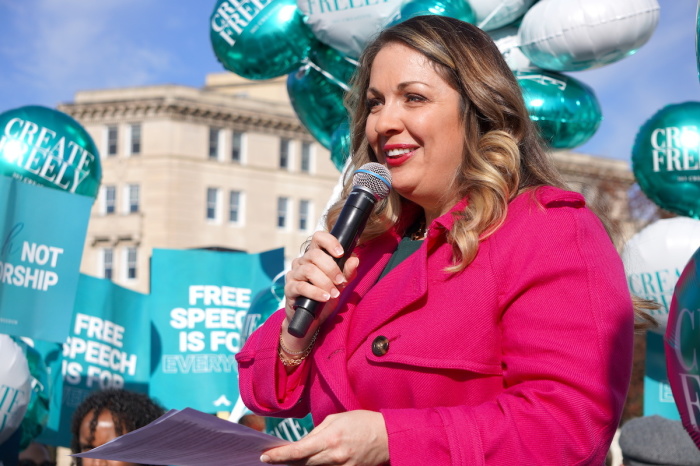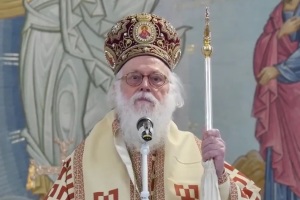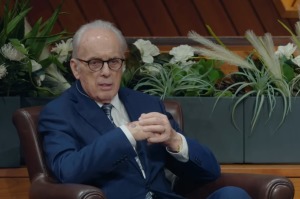Colo. can't punish Christian website designer for refusing to create sites against her beliefs: Supreme Court

The United States Supreme Court has ruled that Colorado cannot force a Christian website designer to create websites celebrating same-sex marriage.
In a decision released Friday morning in the case of 303 Creative LLC v. Elenis, the high court ruled 6-3 that Lorie Smith of 303 Creative could not be compelled by state civil rights law to make websites that go against her sincerely-held religious beliefs.
Justice Neil Gorsuch authored the opinion of the court, being joined by Chief Justice John Roberts and Justices Clarence Thomas, Samuel Alito, Brett Kavanaugh and Amy Coney Barrett.
Gorsuch wrote that "no public accommodations law is immune from the demands of
the Constitution" and expressed concern over the state's attempt to control Smith's speech.
"Under Colorado’s logic, the government may compel anyone who speaks for pay on a given topic to accept all commissions on that same topic—no matter the underlying message—if the topic somehow implicates a customer’s statutorily protected trait," wrote Gorsuch.
"Equally, the government could force a male website designer married to another man
to design websites for an organization that advocates against same-sex marriage ... As our
precedents recognize, the First Amendment tolerates none of that."
Gorsuch went on to note that "commitment to speech for only some messages and some persons is no commitment at all" and that "the opportunity to think for ourselves and to express those thoughts freely is among our most cherished liberties and part of what keeps our Republic strong."
Justice Sonia Sotomayor filed a dissenting opinion, being joined by Justices Elana Kagan and Ketanji Brown Jackson, claiming that the majority "grants a business open to the public a constitutional right to refuse to serve members of a protected class."
"The business argues, and a majority of the Court agrees, that because the business offers services that are customized and expressive, the Free Speech Clause of the First Amendment shields the business from a generally applicable law that prohibits discrimination in the sale of publicly available goods and services. That is wrong. Profoundly wrong," Sotomayor wrote.
"[Colorado's law] targets conduct, not speech, for regulation, and the act of discrimination has never constituted protected expression under the First Amendment. Our Constitution contains no right to refuse service to a disfavored group."
In 2016, Lorie Smith of 303 Creative filed a pre-enforcement challenge to the Colorado Anti-Discrimination Act, arguing that the law would force her to offer services that violated her sincerely held belief that marriage is a union between one man and one woman.
A three-judge panel of the U.S. Court of Appeals for the 10th Circuit ruled against Smith in July 2021, with the two-judge majority concluding that "Colorado has a compelling interest in protecting both the dignity interests of members of marginalized groups and their material interests in accessing the commercial marketplace.”
“When regulating commercial entities, like Appellants, public accommodations laws help ensure a free and open economy," said Circuit Judge Mary Beck Briscoe, a Clinton appointee, in the majority opinion.
"Thus, although the commercial nature of Appellants' business does not diminish their speech interest, it does provide Colorado with a state interest absent when regulating noncommercial activity."
Tenth Circuit Chief Judge Timothy M. Tymkovich, a George W. Bush appointee, wrote the dissent, saying that the U.S. Constitution “protects Ms. Smith from the government telling her what to say or do.”
“But the majority takes the remarkable — and novel — stance that the government may force Ms. Smith to produce messages that violate her conscience,” Tymkovich wrote.
“In doing so, the majority concludes not only that Colorado has a compelling interest in forcing Ms. Smith to speak a government-approved message against her religious beliefs, but also that its public-accommodation law is the least restrictive means of accomplishing this goal. No case has ever gone so far.”
In an opinion column published by Real Clear Religion a few months after the panel decision, Smith argued that the ruling against her showed that “the courts are even more open than many of us realized to letting officials punish religious freedom and silence free speech.”
“Incredibly, the majority even decided that – as a person of unique, distinctive creative skills – I constitute a monopoly. And, as a monopoly, I have no legal right to retain my artistic freedom,” Smith added. “The more unique my speech becomes, the more power the government has to regulate it.”
“Imagine telling Taylor Swift that she has to warble whatever lyrics the government directs her to sing because no one writes songs quite like she does.”
Smith appealed her case to the Supreme Court, which heard oral arguments last December.





























